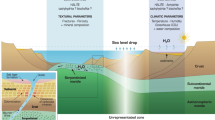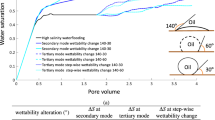Abstract
Salt is a major factor in the origin of petroleum. It leads to the extraction of hydrocarbons from sediments and the formation of oil droplets. Also, salt domes and their cap rocks may trap oil1. Although the diagenesis of salt and brines is well understood, little is known what salty brines may do to infalling organic detritus. Using results from the Caspian Sea and the North Sea we show here that hypersaline solutions close to the sediment–water interface will cure organic matter and that this ‘pickling effect’ is essential for obtaining black and oil shales.
This is a preview of subscription content, access via your institution
Access options
Subscribe to this journal
Receive 51 print issues and online access
$199.00 per year
only $3.90 per issue
Buy this article
- Purchase on Springer Link
- Instant access to full article PDF
Prices may be subject to local taxes which are calculated during checkout
Similar content being viewed by others
References
Tissot, B. & Welte, D. Petroleum Formation and Occurrence (Springer, Heidelberg, 1978).
Hallam, A. (ed.) J. geol. Soc. Lond. (in the press).
Ross, D. A. et al. Init. Rep. DSDP 42 (1978).
Degens, E. T. & Stoffers, P. Nature 263, 22–27 (1976).
Manheim, F. T. & Schug, D. M. Init. Rep. DSDP 42, 637–651 (1978).
Erickson, A. J. & Von Herzen, R. P. Init. Rep. DSDP 42, 1085–1103 (1978).
Boigk, H. Oel 5, 120–128 (1972).
Paluska, A. & Degens, E. T. Geol. Rdsch. 68, 284–301 (1979).
Sulc, S. S. Jr Geologiceskoe stroenije zony soclenenija Urala i Tjan-Sana (Nedra, Moskwa, 1972).
Zubakov, V. A. (ed.) Geochronologija SSSR, T. III, Novejsij etap (pozdnij pliocen–cetverticnyj period) (Nedra, Leningrad, 1974).
Stöcklin, J. Geol. Surv. Iran Tehran Rep. 18 (1971).
Kent, P. E. J. geol. Soc. Lond. 131, 435–468 (1975).
Ziegler, P. A. GeoJournal 1, 7–32 (1977).
Schoell, M. & Faber, E. Nature 275, 436–438 (1978).
Degens, E. T., Von Herzen, R. P., Wong, H. K., Deuser, W. G. & Jannasch, H. W. Geol. Rdsch. 62, 245–277 (1973).
Watson, S. W. & Waterbury, J. B. in Hot Brines and Recent Heavy Metal Deposits in the Red Sea (eds Degens, E. T. & Ross, D. A.) 272–281 (Springer, New York, 1969).
Trüper, H. G. in Hot Brines and Recent Heavy Metal Deposits in the Red Sea (eds Degens, E. T. & Ross, D. A.) 263–271 (Springer, New York, 1969).
Krumbein, W. E. Erdöl Kohle Erdgas Petrochem. 31, 147–151 (1978).
Jannasch, H. W., Trüper, H. G. & Tuttle, J. H. Am. Ass. Petrol. Geol. Mem. 20, 419–425 (1974).
Author information
Authors and Affiliations
Rights and permissions
About this article
Cite this article
Degens, E., Paluska, A. Hypersaline solutions interact with organic detritus to produce oil. Nature 281, 666–668 (1979). https://doi.org/10.1038/281666a0
Received:
Accepted:
Issue Date:
DOI: https://doi.org/10.1038/281666a0
Comments
By submitting a comment you agree to abide by our Terms and Community Guidelines. If you find something abusive or that does not comply with our terms or guidelines please flag it as inappropriate.



